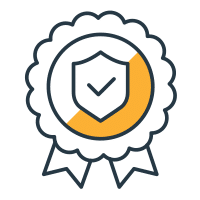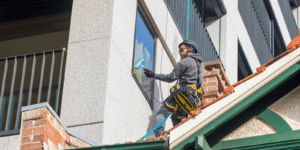Rope access is the fastest-growing sector in the remedial trade works market. With increasing demand and lucrative salaries, becoming a rope access technician can provide much more than an exciting career change. If you’re considering a career in rope access, undertaking proper training and gaining or upgrading your certification level is an important step.

The Importance of Proper Training in Rope Access
Despite the inherent dangers, rope access has established itself as one of the safest methods for working at heights. This impressive safety record is a culmination of the industry’s stringent training, equipment standards, and operational guidelines.
Rope Access falls under the same legal requirements as fall arrest systems where the user must be deemed competent to perform the task. A competent person is “a person who has acquired through training, qualifications or experience the knowledge and skills to carry out the task”
As Rope Access requires a high level of competency on the part of the user, competency is shown through maintaining a current and valid rope access qualification, combined with the operative’s LogBook which documents recent work signed off by an authorised person.

Rope Access Certification Bodies in Australia
In Australia, the primary body for rope access certification is the Industrial Rope Access Trade Association (IRATA). IRATA is an internationally recognised association that sets standards for rope access work globally. Their certification is widely accepted and recognised in many countries. including Australia. Both Safe Work Australia and the Working At Heights Association (WAHA) promote IRATA.
Another organisation is The Society Of Professional Rope Access Technicians (SPRAT). While being very popular in North America, SPRAT training and certification is far less common in Australia.
Both of these organisations aim to promote safety, provide training, and ensure that technicians are certified to a high standard. If you’re considering a career in rope access in Australia, it would be beneficial to seek IRATA certification to maximize employment opportunities.
Levels of Certification in Rope Access
IRATA has established a tiered certification system for rope access technicians. The system is designed to ensure that technicians receive training appropriate to their experience and the complexity of tasks they are expected to undertake. After completing the training for each level, candidates must pass an independent assessment to achieve certification. It’s also worth noting that IRATA certifications are valid for three years, after which technicians must undergo a revalidation process.
IRATA Level 1 (Technician)
IRATA Level 1 is the minimum qualification required to start working in rope access. This entry-level certification is designed for those new to the industry and allows technicians to perform a specified range of rope access tasks under the supervision of a Level 3 technician
- Prerequisites: Be 18 years of age or above and medically and physically fit (requires IRATA medical declaration)
- Training Duration: Minimum of 4 days of training followed by an assessment on the 5th day.
- Skills Covered: Basic rope access techniques, including ascending, descending, basic rescues, and equipment care.
- Limitations: Level 1 technicians must always work under the direct supervision of at least a level 3 technician.
IRATA Level 2 (Operative)
Level 2 (Operative) is for those who have some experience in rope access and are looking to take on more complex tasks and basic rigging.
- Prerequisites: Minimum of 1 year and 1,000 hours of work experience as a level 1 technician.
- Training Duration: Minimum of 4 days of training followed by an assessment on the 5th day.
- Skills Covered: More advanced rope access techniques, including complex rigging, advanced rescues, and aid climbing.
- Limitations: Level 2 technicians can perform more complex tasks but will still require supervision from a Level 3 qualified supervisor, though not as direct as Level 1 technicians.
IRATA Level 3 (Supervisor)
Level 3 (supervisor) is the highest level of certification in the IRATA hierarchy and is intended for those who will take on supervisory roles, overseeing the safety and work of Level 1 and Level 2 technicians.
- Prerequisites: Minimum of 1 year and 1,000 hours of work experience as a Level 2 technician. A valid first aid certificate is also often required.
- Training Duration: Minimum of 4 days of training followed by an assessment on the 5th day.
- Skills Covered: Advanced rigging and rescue techniques, site supervision, risk assessment, and emergency procedures.
- Responsibilities: Level 3 technicians are responsible for the overall safety of rope access operations, ensuring that work is conducted according to IRATA guidelines and standards.


How to Choose an IRATA Training Provider
Choosing the right IRATA training provider is crucial. Remember, the goal is not just to get certified but to gain the skills and knowledge necessary to work safely and efficiently in rope access. Here’s some advice for those seeking IRATA training:
Accreditation
- Ensure that the training provider is officially accredited by IRATA. Accredited providers adhere to IRATA’s strict training standards and guidelines. You can check the official IRATA website to verify accreditation providers.
Reputation
- Research the reputation of the training provider. Look for reviews, and testimonials, or ask for recommendations from colleagues or industry professionals. A training provider with a strong reputation is likely to offer high-quality training.
Facilities
- Consider the training facilities. A good training provider should have well-equipped facilities that simulate real-world rope access scenarios. This ensures that you get hands-on experience in a controlled environment.
Trainer Experience
- Investigate the experience and qualifications of the trainers. Experienced trainers not only provide instruction but also share real-world insights, tips, and best practices.
Class Size
- Smaller class sizes can offer more personalized attention, ensuring that each student gets adequate hands-on practice and immediate feedback.
Course Duration & Content
- Ensure that the course covers the full IRATA syllabus for the level you’re aiming for. While the minimum training duration is set by IRATA, some providers might offer extended courses with additional content, which can be beneficial.
Cost
- While cost is a factor, it shouldn’t be the only consideration. Remember that in rope access, quality training is an investment in safety. However, it’s wise to compare prices among accredited providers to ensure you’re getting good value.
Ask Questions in Your Rope Access Course
Don’t hesitate to ask questions. Whether it’s about the course content, trainer qualifications, or any other aspect, a reputable training provider should be willing and able to provide clear answers.

Why Quality Rope Access Training Matters
Rope Access is more than just a job; it’s a commitment to safety, skill, and continuous learning. As you consider this career path, remember the importance of proper training and certification from a quality provider.
Anchor Safe Rope Access is hiring qualified tradespeople, such as Painters, Renderers, Waterproofers, or Carpenters with IRATA Level 2 or 3 competency in the Greater Sydney and Melbourne areas. We offer competitive rates based on experience with options for visa sponsorship and level upgrades/revalidation.
FAQ’s
-
Can you fail a rope access course?
Yes, it’s possible to fail. Certification isn’t guaranteed. You must demonstrate both theoretical understanding and practical skills, along with a consistent focus on safety.
If you don’t meet the assessment criteria, you’ll need to undergo further training and re-sit the assessment. A reassessment fee (typically around $800 AUD) usually applies.
-
Does rope access certification expire?
Yes. IRATA certifications are valid for 3 years. To maintain your qualification, you must re-certify before it expires through reassessment. You also need to log regular working hours.
If your certification expires, you won’t be able to move up a level, and you can only continue working at your current level for another 12 months before being able to move up a level.
-
How much does rope access certification cost?
In Australia, rope access courses usually cost between AU $1,650 and AU $1,900, depending on the provider and location.
-
Is rope access in demand in Australia?
Absolutely. Rope access technicians are in demand across multiple sectors including:
- Construction and high-rise maintenance
- Industrial and mining operations
- Offshore oil and gas
There’s especially strong demand in cities like Sydney, Melbourne, and Perth, where infrastructure and building maintenance projects are ongoing.
-
Is rope access Level 1 hard?
Level 1 can be both physically and mentally challenging, particularly if you’re new to working at height or with rope systems. That said, most people pass with good instruction, commitment, and consistent.
Working against your natural fear of heights is part of the challenge, so a good attitude and some resilience go a long way.
-
Is rope access safer than scaffolding?
Rope access can be highly safe for both the building and individuals performing the work following high levels of safety procedures and guidelines and rules.
Scaffolding is a labour-intensive access method that primarily provides a physical platform but still requires additional working-at-heights professionals to carry out the actual tasks safely. Unlike rope access, scaffolding structures remain exposed to the elements and may be more vulnerable during extreme weather events.
Each method, whether scaffolding or rope access, should be tailored to suit the specific requirements of the job and task at hand.
Author Bio
Brad Love is a veteran of the rope access painting and decorating industry, with over 47 years of experience under his belt. Brad is the Service Design and Estimator at Anchor Safe Rope Access and a trusted voice in the painting and decorating community.
Anchor Safe Rope Access
Proudly Australian-owned and backed by the strength of a national height safety leader, Anchor Safe Rope Access is a proven and respected provider of external high-rise cleaning, painting and maintenance. Our Rope Access teams are highly skilled and accredited height safety specialists as well as trade-certified technicians, so you can trust Anchor Safe Rope Access to provide award-winning services at competitive prices.



